Impact of Racism, Sexism and Psychological Vulnerabilities on access and utilization of women’s health support services, for ACB Women living with HIV (Emmanuela Ojukwu, Saima Hirani and Angela Kaida)
This social sciences and humanities research council (SSHRC) funded study aims to assess the impact of discrimination based on race, sex, gender and psychological distress on access and utilization of women’s health HIV support services for ACB women living with HIV in Canada.
COVID and Quality of Life for ACB Women Living with HIV (Emmanuela Ojukwu, Saima Hirani, Tatiana Sotindjo)
The emergence of the COVID-19 pandemic meant the emergence of a double endemic for communities living with HIV. This UBC Hampton Endowment funded study aims to examine the impact of the COVID-19 pandemic on quality of life for ACB women living with HIV in British Columbia.
Helping others and mental well-being: Exploring potential of this social act among youth (Saima Hirani, Emmanuela Ojukwu)
The purpose of this study is to explore youth’s perspectives and experiences regarding prosocial behavior and helping others and its association with their own mental well-being. The study also explores facilitators and barriers that youth face while pursuing the notion of helping others.
Health and Wellbeing of African-Canadian Adolescents in BC (Dr. Elizabeth Saewyc, Emmanuela Ojukwu, Helen Okoye, team members)
In collaboration with the Stigma and Resilience among Vulnerable Youth Research Center (SARAVYC), this project aims to examine trends in engagement in HIV-related health harming behaviors, mental and psychosocial wellbeing and teen pregnancy involvement among African-Canadian adolescents in BC and associated risks and protective factors.This social sciences and humanities research council (SSHRC) funded study aims to assess the impact of discrimination based on race, sex, gender and psychological distress on access and utilization of women’s health HIV support services for ACB women living with HIV in Canada.
Understanding perceived social support and self-efficacy of women: A partnership to promote women’s mental well-being (Saima Hirani, Vicky Bungay, Shannon Christensen)
This project aims to assist our community partner organization for developing effective support strategies for mothers’ and their children’s psychological well-being. Through this partnership, we seek to collect evidence to better understand women’s perceptions about their sources of support, needs and priorities (for them and their children) and how their needs change over time. We also aim to assess the self-efficacy of women receiving services as a measure of their sense of control over their life circumstances.This social sciences and humanities research council (SSHRC) funded study aims to assess the impact of discrimination based on race, sex, gender and psychological distress on access and utilization of women’s health HIV support services for ACB women living with HIV in Canada.
Aboriginal Men’s Health Narratives: Reclaiming our Lives (Victoria Smye, Colleen Varcoe, Annette Browne)
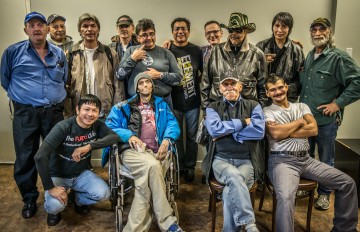
This research project explores Aboriginal men’s experiences of health, wellbeing and social services support. Using a participatory research approach, the study aims to improve Aboriginal men’s access to appropriate, safe and effective health and social services. The study uses various ethnographic methods, including in-depth individual and focus group interviews, photovoice, and participant observations. The research design, process and dissemination are guided by a Community Aboriginal Advisory Team of elders, healers, community men and service organization providers. The findings of this study will be used to inform the planning and design of services for Aboriginal peoples. This project is funded by the Canadian Institutes of Health Research (CIHR).
Advancing Health Equity in the Cancer Care Sector (Tara Horrill, Annette Browne, with colleagues)
Rationale: There are alarming differences in cancer outcomes for people who experience health and social inequities. Because of racism, discrimination, stigma, and other barriers, people can experience extreme difficulties accessing cancer care, and can be diagnosed with cancers so late that they have higher rates of preventable and premature death compared to the rest of the population.
Goal: The main goal of the EQUIP cancer care project is to improve cancer care for people who are experiencing significant health and social inequities. As a first step, we will improve our understanding of the factors that impact the uptake of equity-oriented healthcare strategies within cancer care.
Amlilas: Toward a ‘Namgis Community-Driven Curriculum for Early Childhood Education (Gladys McPherson, Helen Brown)
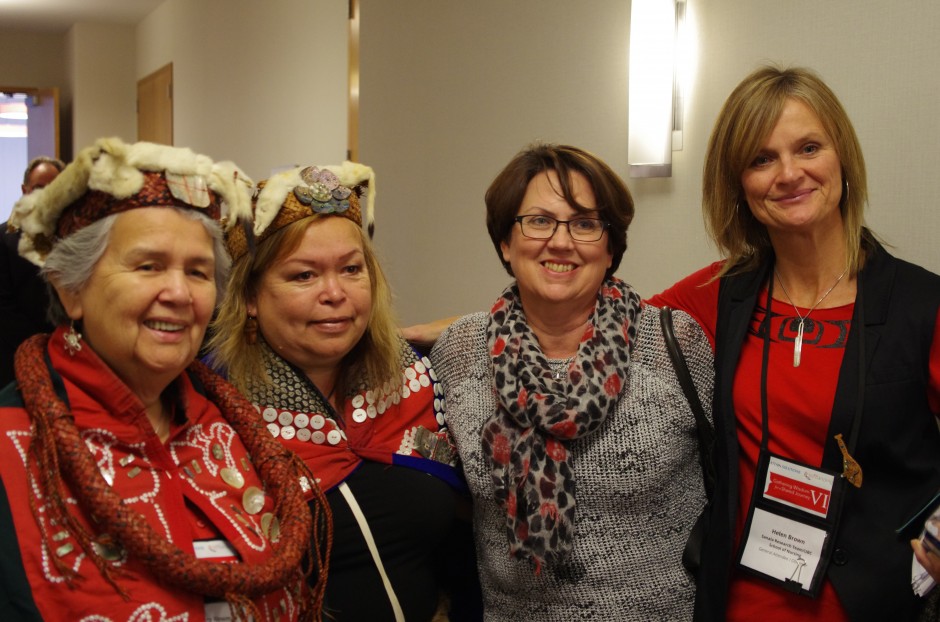
In this project we explore the contribution of cultural learning to the health and development of young ‘Namgis children and their families. The project aims to identify the cultural dimensions of child development within the ‘Namgis First Nation, integrating these into early childhood education in Amlilas – the early childhood development centre for ‘Namgis children and families in Alert Bay. This project will produce a more culturally relevant approach to early childhood education, enhancing the wellbeing of young ‘Namgis children and their families. This research is funded by the Vancouver Foundation.
A realist synthesis addressing early childhood programs combining a determinants of health and community-based public health approach with individuals primary care (Judith Lynam)
This CIHR-funded study seeks to discern how an integrated, family-centric, whole-of-community approach to care in early childhood leads to improved child health and developmental outcomes. This research builds upon insights from the RICHER social pediatrics research programme. CRiHHI investigator Judith Lynam is working with an interdisciplinary Ontario-based research team led by Dr. Ingrid Tyler.
Case managers to improve the management of inflammatory arthritis and associated co-morbidities with First Nations communities: A proof of concept study (Helen Brown)
First Nations people more frequently get inflammatory arthritis and other chronic diseases, and they often have to deal with more than one chronic disease at the same time. First Nations people also face numerous barriers in accessing health services and their experience within the healthcare system hinders self-management efforts. This project will develop and assess a novel model of care that responds to the needs of First Nations people living with arthritis. The model aims to facilitate culturally safe care and foster the development of care plans using a nurse case manager model that integrates management of arthritis with that of other chronic conditions, to improve health outcomes. Through community engagement, the design, responsibilities, and logistics of the model will be finalized. Once established, the case manager model will be evaluated based on: feasibility; acceptance by the community; and, impact on healthcare experiences and health behaviours of First Nations people with arthritis. This project is funded by Canadian Initiatives in Outcomes in Rheumatology Care (CIORA).
EQUIP Emergency (Colleen Varcoe, Annette J. Browne, with colleagues)
This project focuses on the feasibility, process, and impact of implementing an evidence-informed framework for interventions to improve the capacity of Emergency Departments to provide high-quality care to people at greatest risk of experiencing health and health care inequities. Through collaboration among Indigenous leaders, ED staff and leaders and researchers, the project aims to improve care, safety, access, and decrease adverse events for patients and staff. We are adapting the Equity-Oriented Care (EOC) interventions we previously developed for Primary Health Care (PHC) clinics to promote equity, so that they apply to the ED context.
EQUIP Healthcare (Annette Browne, Colleen Varcoe, Sabrina Wong)
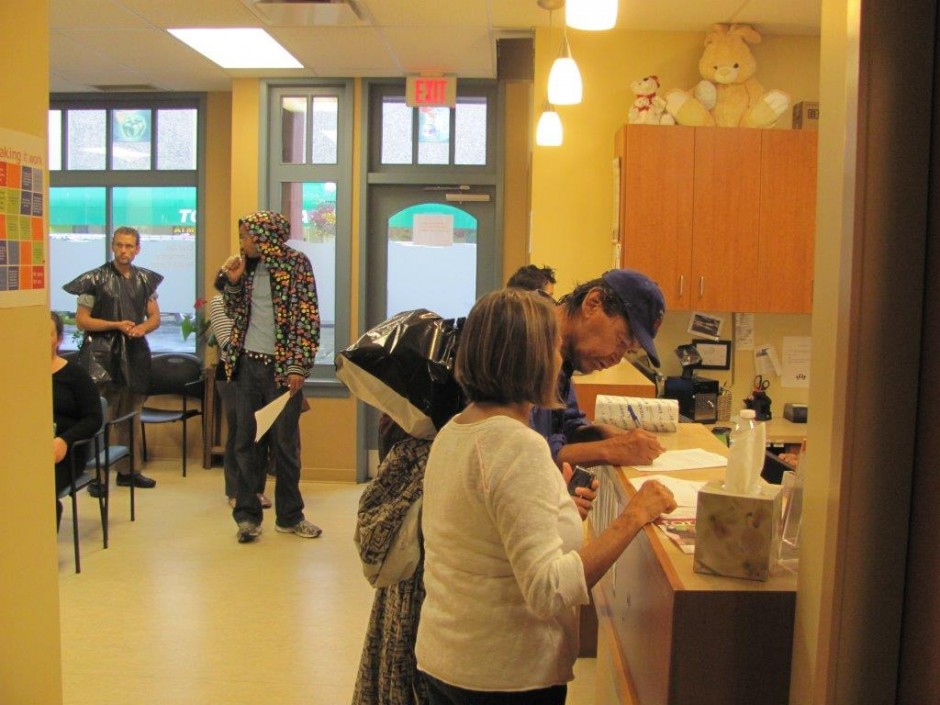
EQUIP Healthcare is a five-year interdisciplinary research program funded by CIHR. This research focuses on improving primary health care (PHC) services for various populations, including Aboriginal and non-Aboriginal people who experience the negative health effects of structural inequities and structural violence. The team will study the effectiveness of an innovative PHC intervention designed to improve delivery of care and health outcomes, particularly for people affected by poverty, trauma and social exclusion. They will also identify the policies needed to support equity-oriented PHC interventions. Key research partnerships are with the Aboriginal Health Program of the BC Provincial Health Services Authority, the Public Health Agency of Canada, Aboriginal health organizations, various PHC agencies in BC and Ontario and Echo: Improving Women’s Health in Ontario. This research is funded by the Canadian Institutes of Health Research (CIHR).
Visit http://equiphealthcare.ca/ to learn more.
EQUIP Health Care: Equity-Oriented Primary Health Care Interventions for Marginalized Populations to Address Structural Inequities and Structural Violence (Annette J. Browne, Colleen Varcoe, with colleagues)
Known as EQUIP Primary Health Care, this research focuses on improving primary health care (PHC) services for various populations, including Indigenous and non-Indigenous people who experience the negative health effects of structural inequities and structural violence. The team continues to study the effectiveness of an innovative equity-oriented intervention designed to improve delivery of care and health outcomes, particularly for people who are most affected by health and social inequities. They are identifying organizational strategies and policies to support equity-oriented interventions in diverse settings.
Fostering Health & Human Rights: A Medical Legal Partnership Pilot Study (Judith Lynam)
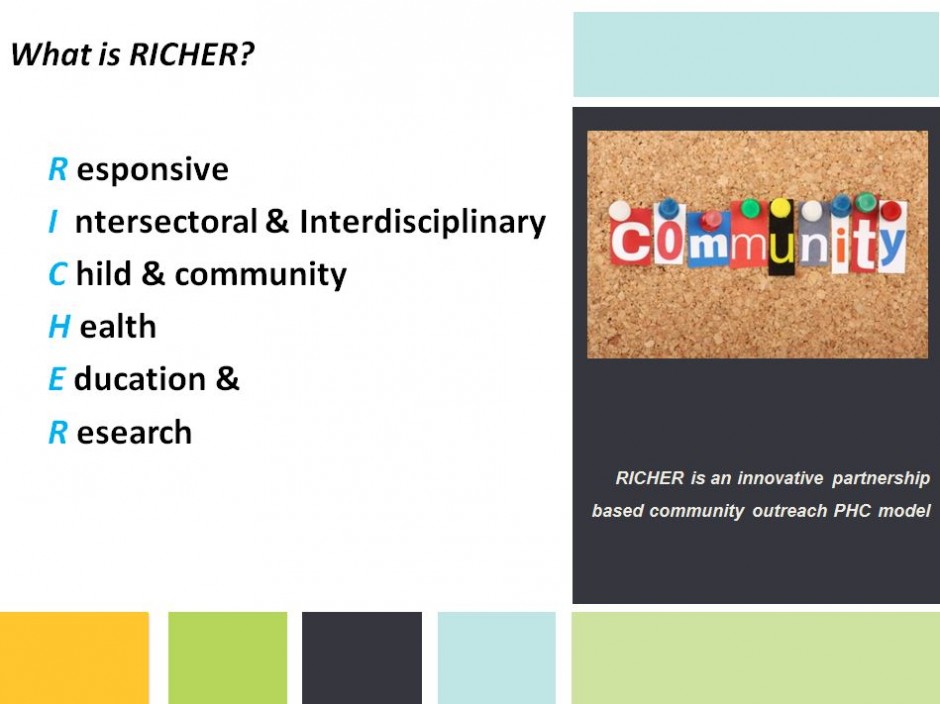
This research represents a new component of the RICHER clinical and research programme. The broad concern of this research is to generate insights to foster child and family health equity. We are undertaking research to examine the ways structural violence operates in the day to day lives of children, youth and families living with marked social and material adversity in Vancouver’s inner city. We will illustrate the impact of structural violence on health, child development and community well being and to use these insights to inform the design of a Medical Legal Community Partnership (MLP). This research is funded by the Vancouver Foundation Community Based Research Grants.
iCAN Plan 4 Safety (Colleen Varcoe)

iCAN Plan 4 Safety is a study to deliver and evaluate an online safety and health resource for women. iCAN Plan 4 Safety is the first interactive, internet-based safety decision aid for Canadian women experiencing intimate partner violence. The tool helps women weigh the dangers of leaving or staying in a relationship, and plan, based on their own priorities and living situation, safety strategies for themselves and their children.
Visit the iCAN Plan 4 Safety website to learn more.
Integration And Deployment of An Anti-Racist Pedagogical Approach Among Health Professional’s Educators (Amelie Blanchet Garneau)
This study aims to understand how educators who use an anti-racist pedagogical approach in courses or programs focused on Indigenous health, during initial training and continuing education of health professionals, integrate this approach and implement it in their practice. Relying on decolonial and biographical narrative methodologies, the results of this study will inform and support the practice of health sciences educators so that they are better equipped to engage, support and deepen dialogue about racism and discrimination in health care while ensuring a safe learning environment.
Inviting Voice, Creating Space: Barriers to Social Inclusion and Safety for Cowichan Women (Helen Brown)
Partnering with Cowichan Valley Safer Futures (CVSF), we are undertaking a project that is exploring the impacts of violence, marginalization and exclusion on women’s community life and health and well-being in the Cowichan Valley that aims to address two research questions: How do experiences of marginalization and social exclusion influence women’s health, well-being and ability to participate in community life? What actions or systemic changes will facilitate safety, well-being and social inclusion as health promotion strategies?
Mobilizing Local Know-How for Community Health Action in a Rural Aboriginal Context (Helen Brown, Gladys McPherson, Colleen Varcoe)
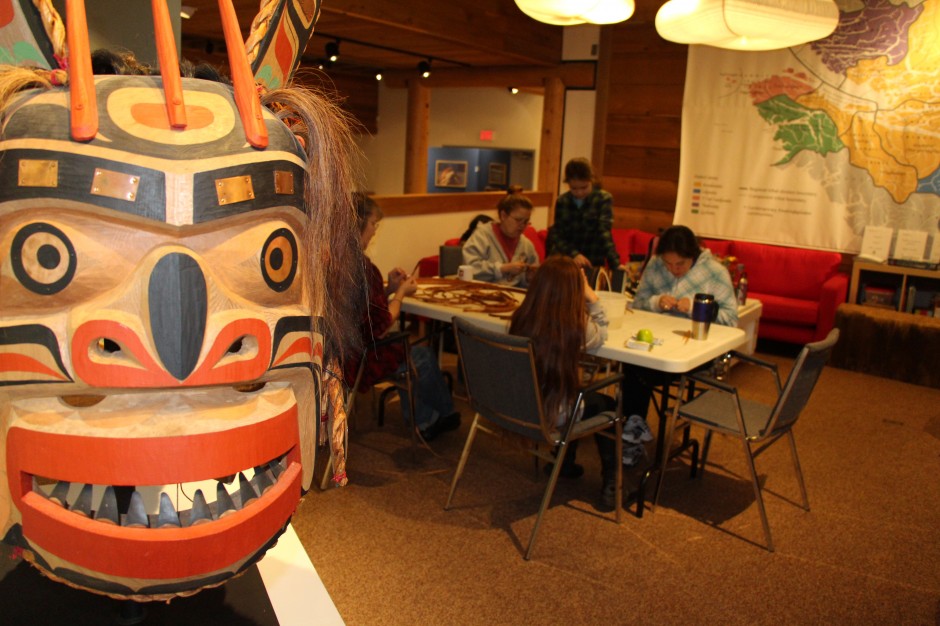
The ‘local know-how project’ is being conducted in a partnership between researchers in the UBC School of Nursing and community leaders from the ‘Namgis First Nation in Alert Bay. Our goals in this project are to enlist local knowledge to design and test the effectiveness of health actions that may enhance health among the youth and the elders of this community. This research is funded by the Vancouver Foundation Health & Medical Education/Research Grants.
Pathways to Care for People Experiencing Substance Use Stigma (Colleen Varcoe, Annette J. Browne, with colleagues)
This project focuses on improving care by reducing the substance use stigma and discrimination that people face in health care settings. Building on our action-oriented research known as EQUIP Health Care, we are designing, implementing and evaluating tools, resources, and strategies to help providers, organizations, and policy-makers deliver equity-oriented health care by reducing substance use stigma, and simultaneously supporting trauma- and violence-informed care, antiracism & cultural safety.
Reclaiming our Spirits: A Health Intervention for Women in an Indigenous Context (Colleen Varcoe, Annette Browne)
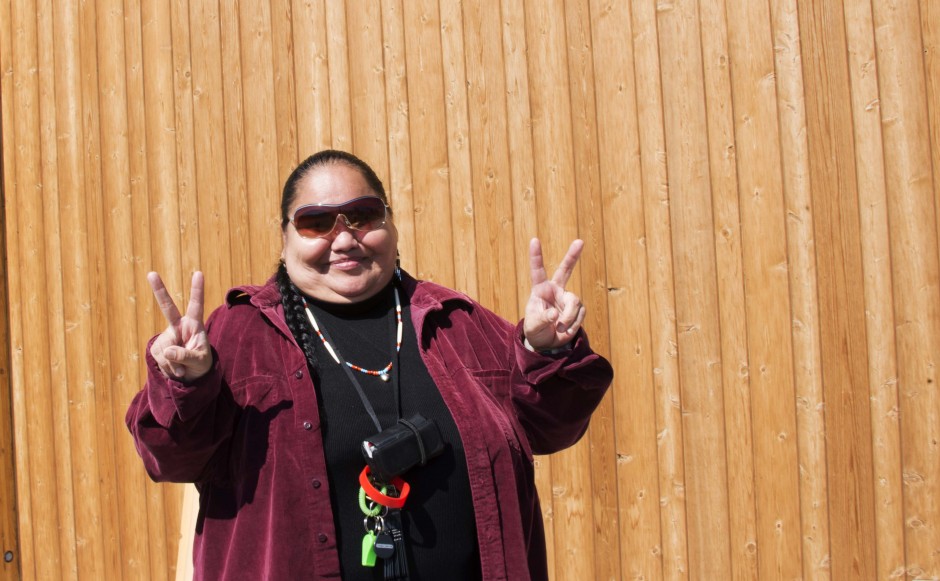
This five year study was named “Reclaiming Our Spirits” by the women who participated in the pilot phase. The study is developing and testing a complex health intervention to help address issues of trauma, violence and pain for Aboriginal women who have experienced partner violence. The study aims to: a) develop an indigenous way of seeing the health of Aboriginal women, b) use that approach to develop a health promoting intervention for Aboriginal women who have experienced intimate partner violence (IPV), and c) test its feasibility and helpfulness for women. This study draws on a previously developed intervention that has been pilot tested showing good effects, such as improvements in women’s quality of life, mental health, chronic pain, social support and sense of confidence which were maintained 6 months after the intervention ended. The previous intervention helped women with safety strategies, symptoms of trauma (such as insomnia and pain), getting basic life necessities, and looking after themselves and their relationships. The pilot of the intervention showed that the women found a circle supported by an Elder, cultural teachings and working with nurses all helped them to improve their health. The intervention is being tested in a full trial in 2014-2015.This project is funded by the Canadian Institutes for Health Research.
Strategy for Patient Oriented Primary and Integrated Health Care Innovation Network (Sabrina Wong, Annette Browne)
The goal of the BC SPOR Network is to encourage, facilitate and support government, health authorities, and health professions to seek out, develop, and adopt health care innovations with promise to improve BC’s health care delivery system. To achieve this goal, we envision that the proposed BC SPOR Network will: 1) Enable the achievement of optimal health outcomes for residents of BC, particularly for those with complex care needs across the life course; and 2) Achieve greater efficiency and effectiveness within the health care system by bringing together knowledge users (KU), (e.g., health care professionals and other providers, managers and administrators), patients and their families, communities, and researchers so they can learn from each other, collectively generate new knowledge, and chart a common future. This project is funded by the Canadian Institutes of Health Research, SPOR Network in Primary and Integrative Health Care Innovations Development Grant.
TRANSFORMATION: Transforming Community Based Primary Health Care Delivery through Comprehensive Performance Measurement and Reporting (Sabrina Wong, Annette Browne, Colleen Varcoe)
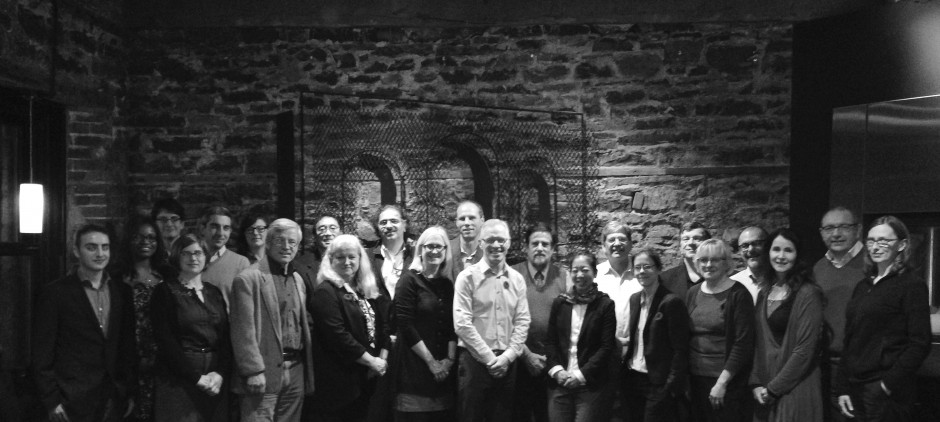
Public performance reporting has the potential to improve the quality of care, increase accountability, and facilitate public participation in healthcare. The overall goal of TRANSFORMATION is to demonstrate the feasibility and usefulness of comparative and comprehensive community-based primary health care (CBPHC) performance measurement and reporting to inform innovation of the Canadian PHC system.
Visit TRANSFORMATION’s website to learn more.
Work 2 Give Research: Enlisting Positive Masculinities for Meaningful Work for Incarcerated Aboriginal Men in British Columbia (Helen Browne, Colleen Varcoe)

Aboriginal men in Canada are significantly over-represented within the criminal justice system. Incarcerated men often have significant idle time on their hands, and this inactivity contributes to an institutional subculture associated with substance use, violence, gambling, debt, self-harm, and depression. The paramilitary and hypermasculine structures of prison life exacerbate pre-existing mental health problems; incarceration itself is hazardous to men’s overall health and rehabilitation.
Through an initiative called Work 2 Give, Aboriginal inmates make items needed by some of Tsilhqot’in communities in BC. Supported by the Movember Foundation Innovation Fund, this research project focuses on how Work 2 Give impacts the inmates themselves and their rehabilitative processes, as well as the First Nations children and families receiving the needed food, clothing, furniture, and cultural items.
Listen here (starting from 0:30:25) to an interview about the project with Helen Brown and Sarah Jackman – Executive Director of the Punky Lake Wilderness Camp Society – on CBC’s On the Coast from November 7, 2014.